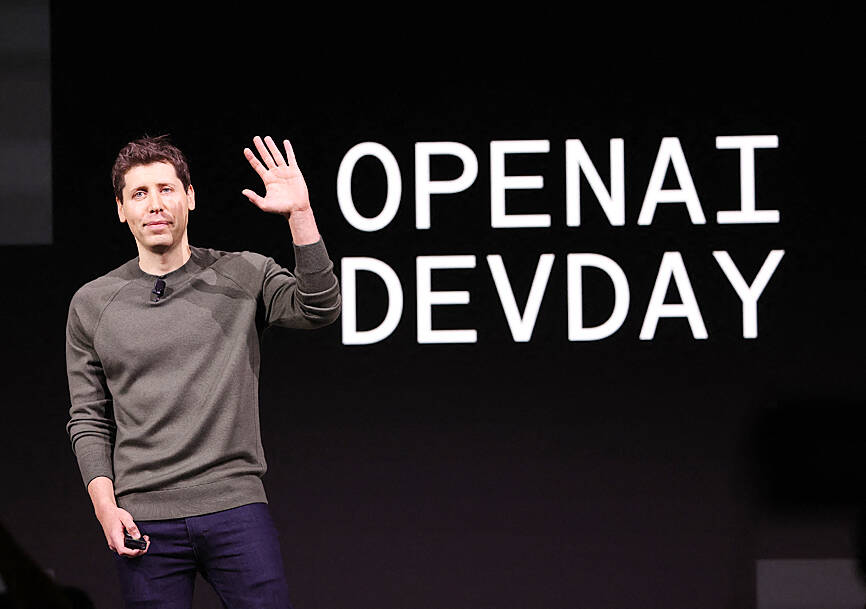ChatGPT maker OpenAI on Monday moved to entice developers with lower prices and the ability to easily tailor artificial intelligence (AI) “agents” to help with anything from laundry advice to contract negotiations.
“We will be able to do more, to create more, and to have more,” Open AI chief executive Sam Altman told developers at a gathering in San Francisco. “As intelligence is integrated everywhere, we will all have superpowers on demand.”
More than 2 million developers are building on the OpenAI platform, while more than 100 million people use ChatGPT weekly, according to the San Francisco-based start-up.

Photo: AFP
The launch of ChatGPT in November last year ignited an AI race, with contenders including Amazon.com Inc, Google, Microsoft Corp and Meta Platforms Inc.
On Monday, Altman announced a “Turbo” version of OpenAI’s leading software along with reduced pricing in moves that could fuel the spread of the technology.
“It’s a smarter model,” Altman said of ChatGPT-4 Turbo. “We decided to prioritize price first, but we’re going to work on speed next.”
OpenAI is rolling out the ability to create custom “agents,” called “GPTs,” capable of handling specific tasks such as business negotiation advice, tips on removing stains from laundry, help with homework, and tech support, it said in a blog post.
“Anyone can easily build their own GPT — no coding is required,” OpenAI said. “You can make them for yourself, just for your company’s internal use, or for everyone.”
Later this month, OpenAI will launch a GPT “store,” and plans to add a way for developers to make money based on how many people use their GPTs, according to the company.
“I’m really looking forward to Turbo and everything else that you have coming,” Microsoft chief executive Satya Nadella said after joining Altman on stage.
Microsoft has invested billions of dollars in OpenAI and has woven the company’s technology into its offerings, including search engine Bing.

The DBS Foundation yesterday announced the launch of two flagship programs, “Silver Motion” and “Happier Caregiver, Healthier Seniors,” in partnership with CCILU Ltd, Hondao Senior Citizens’ Welfare Foundation and the Garden of Hope Foundation to help Taiwan face the challenges of a rapidly aging population. The foundation said it would invest S$4.91 million (US$3.8 million) over three years to foster inclusion and resilience in an aging society. “Aging may bring challenges, but it also brings opportunities. With many Asian markets rapidly becoming super-aged, the DBS Foundation is working with a regional ecosystem of like-minded partners across the private, public and people sectors

BREAKTHROUGH TECH: Powertech expects its fan-out PLP system to become mainstream, saying it can offer three-times greater production throughput Chip packaging service provider Powertech Technology Inc (力成科技) plans to more than double its capital expenditures next year to more than NT$40 billion (US$1.31 billion) as demand for its new panel-level packaging (PLP) technology, primarily used in chips for artificial intelligence (AI) applications, has greatly exceeded what it can supply. A significant portion of the budget, about US$1 billion, would be earmarked for fan-out PLP technology, Powertech told investors yesterday. Its heavy investment in fan-out PLP technology over the past 10 years is expected to bear fruit in 2027 after the technology enters volume production, it said, adding that the tech would

YEAR-END BOOST: The holiday shopping season in the US and Europe, combined with rising demand for AI applications, is expected to drive exports to a new high, the NDC said Taiwan’s business climate monitor improved last month, transitioning from steady growth for the first time in five months, as robust global demand for artificial intelligence (AI) products and new iPhone shipments boosted exports and corporate sales, the National Development Council (NDC) said yesterday. The council uses a five-color system to measure the nation’s economic state, with “green” indicating steady growth, “red” suggesting a boom and “blue” reflecting a recession. “Yellow-red” and “yellow-blue” suggest a transition to a stronger or weaker condition. The total score of the monitor’s composite index rose to 35 points from a revised 31 in August, ending a four-month

Taiwan Semiconductor Manufacturing Co (TSMC, 台積電) has secured three construction permits for its plan to build a state-of-the-art A14 wafer fab in Taichung, and is likely to start construction soon, the Central Taiwan Science Park Bureau said yesterday. Speaking with CNA, Wang Chun-chieh (王俊傑), deputy director general of the science park bureau, said the world’s largest contract chipmaker has received three construction permits — one to build a fab to roll out sophisticated chips, another to build a central utility plant to provide water and electricity for the facility and the other to build three office buildings. With the three permits, TSMC